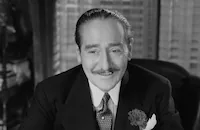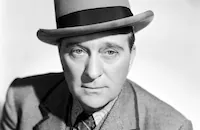Little Miss Marker

Brief Synopsis
Cast & Crew
Alexander Hall
Adolphe Menjou
Dorothy Dell
Charles Bickford
Shirley Temple
Lynne Overman
Film Details
Technical Specs

Synopsis
Against his better judgement, Broadway bookie Sorrowful Jones accepts a little girl as a "marker," or I.O.U., for her father's twenty-dollar bet on the horse "Dream Prince." Big Steve Halloway, who owns "Dream Prince" and the Horse Shoe Cabaret, gets his cohorts to bet on "Dream Prince" to lose, because he knows that if he "speedballs" the horse with drugs one more time, the horse will die. Later, however, Steve plans to race the horse to win, and asks Jones to front him ten thousand dollars to bet. An article in the newspaper that day informs Jones and Steve's gang that Steve is under investigation because of his previous bet, and another article announces that the little girl's father committed suicide. Dubbing her Little Miss Marker, although her real name is Martha Jane, the gang decides to make her owner of "Dream Prince" so they can race the horse without suspicion. "Marky" is delighted to have a horse of her own, because it fits in with all the Arthurian legends her mother read to her before she died, and is disappointed when Steve takes the horse away. Two of the gang's thugs, Sore Toe and Canvas Back, are appointed as babysitters, while Jones acts as her guardian. Marky renames all of her new pals with names of knights of the Round Table. After Steve goes to Chicago to place his bets, his girl friend, Bangles Carson, falls asleep at Jones's apartment while singing Marky to sleep. The next day, Bangles orders new clothes for Marky and, secretly in love with Jones, advises him he could use a new suit as well. Surprising even himself, the crusty Jones pays for Marky's new clothes and buys himself a suit, reaffirming Bangles' faith in him. Bangles takes in Marky when the police come to search for her in Jones's apartment. Bangles' maid wires Steve that Bangles is seeing Jones, and Steve returns with vengeance on his mind. He interrupts a party at which Bangles, Jones and all their friends are dressed like knights of the Round Table. Bangles and Jones staged the party hoping to renew Marky's innocence and faith, which have been lost due to over-exposure to the gang's tough ways. When they allow Marky to ride "Dream Prince," Marky's sweetness is finally restored, but Steve causes the horse to rear, and it throws Marky to the floor. Jones rushes her to the hospital and drags the best children's surgeon away from his own wedding to operate on her. When Steve comes for revenge against Jones and Bangles, he is drafted into providing a life-saving blood transfusion for Marky. Feeling magnanimous after his donation, Steve bows out gracefully, while Jones destroys the speedball, thus ensuring "Dream Prince's" survival. He and Bangles rejoice in their love and Marky's recovery.

Director

Alexander Hall
Cast

Adolphe Menjou
Dorothy Dell

Charles Bickford

Shirley Temple

Lynne Overman

Warren Hymer

Sam Hardy
John Kelly
Frank Mcglynn Sr.
Jack Sheehan

Frank Conroy
Tammany Young
Dream Prince
Garry Owen

Willie Best
Pudgy White
Edward Earle

James Burke
Mildred Gover
Lucille Ward
Crauford Kent
Phil Bloom
Joe Herrick
Tom Gardner
Willie Keeler
Solly Kreiger
Sailor Vincent
Barney O'toole
Jack Green
Texas Kid
Crew

Videos
Movie Clip



Promo
Film Details
Technical Specs

Articles
Little Miss Marker (1934)
Although Runyon wrote the story two years prior to the film's release, the tale's origins stretch back much further. In The Story of Damon Runyon, author Michael D. McClanahan explains: "Clear back in 1914, Runyon had his first inkling of the plot. Out for a stroll in New York one day, he parked his newborn daughter in her carriage in a pool hall while he went into the back room to place a bet with the bookies who officed there. When one of the pool players inquired of another about the presence of such an uncommon object in the establishment, the reply was simply, "Runyon's marker." Runyon overheard the remark and filed it in the back of his mind for future reference."
With the script secured, the studio signed on Alexander Hall to direct (He would later score an Oscar nomination for Best Director in 1941 for Here Comes Mr. Jordan). When word got out that Paramount was looking to cast the part of the little girl, Gertrude Temple engineered a meeting between Hall and her five-year old daughter Shirley.
According to her autobiography, Child Star, Shirley Temple remembers the audition as exceptionally brief: "Seated facing one another, Hall said, "Say 'Aw, nuts.'" "Aw, nuts!" I repeated. Scram!" he said. "Scram!" I echoed. "Okay," he said, rising. "Okay," I continued with undiminished enthusiasm. "No, kid! Stop!" he said. "We're finished. Let's go see Mother." It was as quick as that." Temple was under contract at Fox at the time so Paramount had to pay $1000 a week to "borrow" the child actress, a wise investment in view of what was to come.
Cast opposite Temple was Adolphe Menjou in the role of Sorrowful Jones. Menjou, with his trademark greased mustache, was known as the best-dressed man in Hollywood. The very picture of sleek sophistication, he earned that reputation in A Woman of Paris (1923), a role director Charlie Chaplin selected especially for him. Menjou later earned a Best Actor Oscar nomination for The Front Page (1931), but today he is probably better known for his rabid anti-communist agitation in Hollywood and his involvement in the 1947 hearings of the House Un-American Activities Committee. During production of Little Miss Marker, however, Menjou was more intimidated by his tiny co-star than his performance indicated; a passage from Temple's autobiography, Child Star, reveals an interesting side of the actor. "'This child frightens me,' Menjou openly confessed. 'She knows all the tricks. She backs me out of the camera, blankets me, grabs my laughs. She's making a stooge out of me. She's an Ethel Barrymore at six! If she were forty years old, she wouldn't have had time to learn all she knows about acting.'" Menjou had good cause to feel this way, for Temple was poised on the verge of super stardom -and Little Miss Marker would be her springboard.
Among the standouts in the superb supporting cast of Little Miss Marker are Charles Bickford and Dorothy Dell. Bickford would go on to earn supporting Oscar nominations for his work in The Song of Bernadette (1943), The Farmer's Daughter (1947), and Johnny Belinda (1948). Fledging actress Dorothy Dell, who, at fifteen, had won both Miss America and Miss Universe titles, would unfortunately see her promising career cut short by a tragic automobile accident at nineteen, making Little Miss Marker one of her only three films.
Upon its release, Little Miss Marker was a major box office hit: "Temple Holds 'Em Three Weeks," blared the headlines, referring to an over-$100,000 gross at the Paramount in New York City during that brief time period. Shirley was indeed a bona fide star; within days, her salary catapulted from $150 a week to over $1250. She would be awarded a special honorary Oscar in the same year, "In grateful recognition of her outstanding contribution to screen entertainment during the year 1934." Temple would go on to star in a total of forty-four films as a child, from 1931 to 1940 - from singing "The Good Ship Lollipop" in Bright Eyes (1934) to dancing with Bill "Bojangles" Robinson in The Little Colonel and The Littlest Rebel (both 1935). As a final coup de grace, Little Miss Marker was deemed "culturally significant" in 1998 by the Library of Congress, and selected for preservation in the United States Film Registry. Little Miss Marker was later remade as Sorrowful Jones (1949) starring Bob Hope and Mary Jane Saunders, Forty Pounds of Trouble (1963) featuring Tony Curtis and Claire Wilcox, and under the original title in 1980 with Walter Matthau and Sara Stimson.
Producer: B.P. Schulberg
Director: Alexander Hall
Screenplay: William Lipman, Gladys Lehman, Sam Hellman, based on the story by Damon Runyon
Cinematography: Alfred Gilks
Editing: William Shea
Music: Ralph Rainger
Cast: Adolphe Menjou (Sorrowful Jones), Dorothy Dell (Bangles Carson), Shirley Temple (Miss Marker), Charles Bickford (Big Steve), Lynne Overman (Regret).
BW-79m. Closed captioning.
by Eleanor Quin

Little Miss Marker (1934)
Quotes
Trivia
Adolphe Menjou was having difficulty with a particular line in the script. At the prompting of others on the set, Shirley Temple, (aged 6) turned to director Alexander Hall and asked "Is it too late to replace Mr. Menjou on this picture?".
The character of Regret, named after the prize winning 1915 racehorse, was in fact Otto "Abadabba" Berman, the financial genius behind gangster Dutch Schultz's business empire and best friend of writer Damon Runyon. Berman was shot dead in a hit on Schultz a year after the film's release.
Notes
The working title of the film was Half Way Decent. The title card of the film reads "Damon Runyon's Little Miss Marker." Lynne Overman and Jack Sheehan made their film debuts in this film. According to copyright records, Los Angeles surgeon Vern Sopher was technical adviser for the hospital scene. An article in a 1941 Los Angeles Examiner stated that producer Buddy DeSylva was considering the possibility of a follow-up film starring Shirley Temple, Adolphe Menjou and Lynne Overman, tentatively titled Little Miss Marker Grows Up. This film was never made. A modern source notes that Paramount had been considering casting Jackie Cooper in a revised version of the Runyon story before they borrowed Shirley Temple from Fox Film Corp. Modern sources include Hattie McDaniel, Bill Robinson and Bessie Lyle in the cast. Also based on Runyon's story are Paramount's 1949 film Sorrowful Jones, directed by Sidney Lanfield and starring Bob Hope, Lucille Ball and Jane Saunders; Universal's 1962 film Forty Pounds of Trouble, directed by Norman Jewison and starring Tony Curtis, Suzanne Pleshette and Claire Wilcox; and Universal's 1980 film Little Miss Marker, directed by Walter Bernstein and starring Walter Matthau, Julie Andrews and Tony Curtis.















